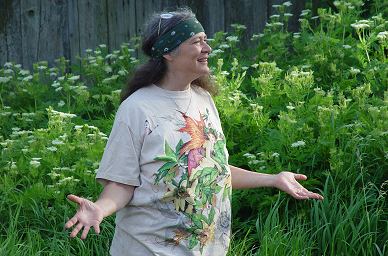Special to The Capital Times
April 3, 2003
Mention Susun Weed's name in alternative healing circles and
the conversation often takes on a tone of reverence -- which
is somewhat ironic, given that the 57-year-old folk herbalist
takes a certain pleasure in skewering some of natural medicine's
most popular "cure-alls."
Take soy, for instance. Once the domain of die-hard vegetarians,
soy
is making its way into mainstream American cuisine after a
series of medical studies demonstrated the beneficial effects
of soy compounds on heart health and menopause.
It's all a big mistake, says Weed, author of "New
Menopausal Years the Wise Woman Way," "Breast
Cancer? Breast Health! the Wise Woman Way"
plus two other books on women's health and natural healing.
"Most women who stop eating large amounts of tofu find
a very improved state of health," Weed said last week
after dinner at her home in Woodstock, N.Y. She will be in
Madison this weekend to lecture on menopause and herbal healing.
Weed cites research by food scientist Mary Enig and epidemiology
studies that differentiate between the fermented soy products
traditional in Japan and the unfermented soy products popular
in the United States.
"In Japan, where admittedly breast cancer is low, the
primary use of soy is fermented soy -- miso and tamari,"
says Weed. "Fermented soy is responsible for 90 percent
of the soy eaten in the Japanese diet. Any Japanese person
who ate tofu more than once a week doubled the risk of Alzheimer's."
There are no sacred cows in Weed's approach to wellness and
no hard-and-fast rules. She calls her approach the Wise Woman
Way, a spiritual healing path that draws strongly on oral
tradition and folklore. "I am not telling women how to
do it right -- because there is no one right way -- I am sharing
all the ways there are to do it, so they can choose, so they
have their own power," she writes on her Web site.
Weed's live-and-let-live approach translates into book sales
well over the half-million mark and has garnered praise from
a number of well-known physicians, including Christiane Northrup
and Susan Love. Learn
more about the Wise Woman Herbal Series at Ash Tree Publishing
online.
Not bad for a woman without a college degree. Weed studied
mathematics and artificial intelligence at UCLA for two years
but dropped out "to pursue life," she says. For
the past 35 years she has studied herbs through apprenticeships,
exhaustive reading, and experimentation. The absence of credentials
concerns her critics, who call her approach "misguided"
and "dangerous thinking." Especially controversial
are her thoughts on mammograms (more harm than good) and progesterone
creams (ditto), but her doubts about these approaches are
echoed in some mainstream medical literature.
"I love science. I read a lot of scientific things.
It's kind of a free-for-all, people arguing back and forth,"
Weed says. "It's not infallible, (but) it's self-correcting."
The Wise Woman philosophy emphasizes nourishment, intuition
and accepting change. "It accepts everything from shamanic
trances and placebos to surgery and chemotherapy," Weed
says. "In the Wise Woman tradition, all options are open
to me."
But don't get her started on that awful-tasting flax oil
women are told to swallow by the spoonful to ward off breast
cancer. The reason it tastes so awful is because it's rancid,
Weed says. "The chemist friends that I've asked about
flax oil tell me it's like cancer in a can because of the
rancidity factor."
She suggests buying whole flax seeds instead, and grinding
them in a coffee or spice grinder. "When ground and cooked
in baked goods like bread and muffins, flax seed is a wonderful
addition to the diet."
Note that she says "cooked." She's not fond of
the raw foods craze sweeping health-obsessed sectors of the
nation. She sees it as the newest in a long line of "natural"
approaches that punish the body and taste buds in pursuit
of unnatural perfection.
"When someone comes along and says this is a way to
be clean and be pure, we're suckers for it," Weed says.
The
Wise Woman tradition "is when we stop cleansing
and purifying, when we start accepting ourselves and others
for the incredible, magical gift of sacredness that we are."

Kathryn Kingsbury
Freelance journalist
Madison, Wisconsin, USA
kathrynkingsbury@terracom.net
Click here for another interview with Susun Weed:
Journey
Through Menopause by Doug Blackburn
Read Susun Weed's Autobiography ~ Becoming
an Herbalist: An eleven-part series





